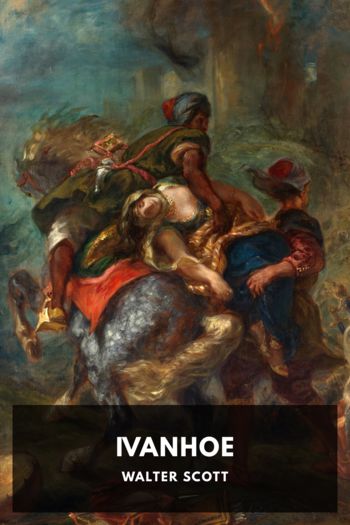Ivanhoe - Walter Scott (bookreader txt) 📗

- Author: Walter Scott
Book online «Ivanhoe - Walter Scott (bookreader txt) 📗». Author Walter Scott
All now looked around and enquired for Ivanhoe, but he had vanished. It was at length discovered that a Jew had been to seek him; and that, after very brief conference, he had called for Gurth and his armour, and had left the castle.
“Fair cousin,” said Athelstane to Rowena, “could I think that this sudden disappearance of Ivanhoe was occasioned by other than the weightiest reason, I would myself resume—”
But he had no sooner let go her hand, on first observing that Ivanhoe had disappeared, than Rowena, who had found her situation extremely embarrassing, had taken the first opportunity to escape from the apartment.
“Certainly,” quoth Athelstane, “women are the least to be trusted of all animals, monks and abbots excepted. I am an infidel, if I expected not thanks from her, and perhaps a kiss to boot—These cursed grave-clothes have surely a spell on them, everyone flies from me.—To you I turn, noble King Richard, with the vows of allegiance, which, as a liege-subject—”
But King Richard was gone also, and no one knew whither. At length it was learned that he had hastened to the courtyard, summoned to his presence the Jew who had spoken with Ivanhoe, and after a moment’s speech with him, had called vehemently to horse, thrown himself upon a steed, compelled the Jew to mount another, and set off at a rate, which, according to Wamba, rendered the old Jew’s neck not worth a penny’s purchase.
“By my halidome!” said Athelstane, “it is certain that Zernebock hath possessed himself of my castle in my absence. I return in my grave-clothes, a pledge restored from the very sepulchre, and everyone I speak to vanishes as soon as they hear my voice!—But it skills not talking of it. Come, my friends—such of you as are left, follow me to the banquet-hall, lest any more of us disappear—it is, I trust, as yet tolerably furnished, as becomes the obsequies of an ancient Saxon noble; and should we tarry any longer, who knows but the devil may fly off with the supper?”
XLIIIBe Mowbray’s sins so heavy in his bosom,
That they may break his foaming courser’s back,
And throw the rider headlong in the lists,
A caitiff recreant!
Our scene now returns to the exterior of the Castle, or Preceptory, of Templestowe, about the hour when the bloody die was to be cast for the life or death of Rebecca. It was a scene of bustle and life, as if the whole vicinity had poured forth its inhabitants to a village wake, or rural feast. But the earnest desire to look on blood and death, is not peculiar to those dark ages; though in the gladiatorial exercise of single combat and general tourney, they were habituated to the bloody spectacle of brave men falling by each other’s hands. Even in our own days, when morals are better understood, an execution, a bruising match, a riot, or a meeting of radical reformers, collects, at considerable hazard to themselves, immense crowds of spectators, otherwise little interested, except to see how matters are to be conducted, or whether the heroes of the day are, in the heroic language of insurgent tailors, flints or dunghills.
The eyes, therefore, of a very considerable multitude, were bent on the gate of the Preceptory of Templestowe, with the purpose of witnessing the procession; while still greater numbers had already surrounded the tiltyard belonging to that establishment. This enclosure was formed on a piece of level ground adjoining to the Preceptory, which had been levelled with care, for the exercise of military and chivalrous sports. It occupied the brow of a soft and gentle eminence, was carefully palisaded around, and, as the Templars willingly invited spectators to be witnesses of their skill in feats of chivalry, was amply supplied with galleries and benches for their use.
On the present occasion, a throne was erected for the Grand Master at the east end, surrounded with seats of distinction for the Preceptors and Knights of the Order. Over these floated the sacred standard, called Le Beau-seant, which was the ensign, as its name was the battle-cry, of the Templars.
At the opposite end of the lists was a pile of faggots, so arranged around a stake, deeply fixed in the ground, as to leave a space for the victim whom they were destined to consume, to enter within the fatal circle, in order to be chained to the stake by the fetters which hung ready for that purpose. Beside this deadly apparatus stood four black slaves, whose colour and African features, then so little known in England, appalled the multitude, who gazed on them as on demons employed about their own diabolical exercises. These men stirred not, excepting now and then, under the direction of one who seemed their chief, to shift and replace the ready fuel. They looked not on the multitude. In fact, they seemed insensible of their presence, and of everything save the discharge of their own horrible duty.
And when, in speech with each other, they expanded their blubber lips, and showed their white fangs, as if they grinned at the thoughts of the expected tragedy, the startled commons could scarcely help believing that they were actually the familiar spirits with whom the witch had communed, and who, her time being out, stood ready to assist in her dreadful punishment. They whispered to each other, and communicated all the feats which Satan had performed during that busy and unhappy period, not failing, of course, to give the devil rather more than his due.
“Have you not heard,





Comments (0)